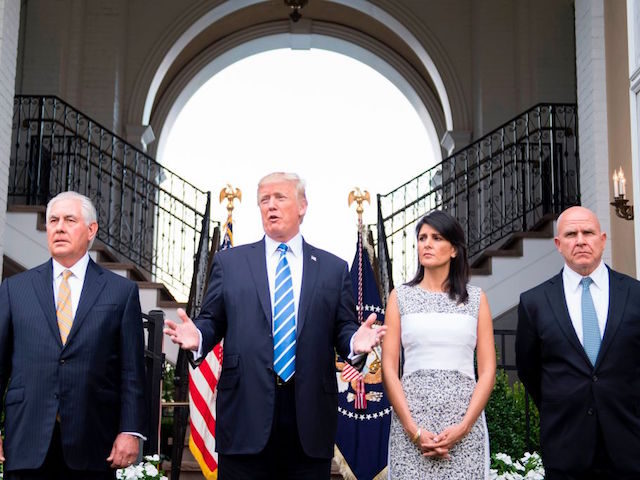President Donald Trump will not re-certify to Congress Iranian compliance with the landmark nuclear deal signed in 2015 under President Barack Obama, but will keep the agreement itself in place.
Congress will be urged to pass new “trigger points” to hold the Iranians to account and the Treasury Department will be directed to place additional sanctions on the Iranian Islamic Revolutionary Guard Corps (IRGC), a wing of the Iranian military accused of terrorist acts in support of the Iranian regime throughout the region.
“The President has come to the conclusion that he cannot certify … that the sanctions relief we provided [Iran] is proportionate to the benefit we are seeing,” Secretary of State Rex Tillerson said on a Thursday evening press conference call where he and National Security Advisor H.R. McMaster laid out the broad strokes of what a White House fact sheet referred to as “President Donald J. Trump‘s New Strategy on Iran.”
The plan, according to McMaster, was the product of “months of an inter-agency process.”
The administration will not certify to Congress Iran’s compliance with the Joint Comprehensive Plan of Action (JCPOA), better known as the Iran nuclear deal, or that the sanctions relief given under the deal is providing proportionate benefits to the United States.
It is required to do so every 90 days under a law called the Iran Nuclear Agreement Review Act (INARA), passed nearly unanimously by Congress in the furor that surrounded President Obama reaching the agreement with the Iranians largely without consulting the Republican-controlled Senate. Although there has been no showing that the Iranian government has violated the terms of the JCPOA, Ambassador to the United Nations Nikki Hailey said last month that the president “has grounds to stand on” in refusing to certify compliance should he choose to do so.
Reporting Wednesday indicated the administration has suffered serious internal tension over whether to certify under INARA since July, when the pro-certification elements of President Trump’s national security team won out before the last certification deadline. Last week, Dr. Sebastian Gorka, the former White House advisor and Breitbart News national security editor, who was present at those negotiations, told Breitbart News, “I can tell you one thing: I was in the Oval the day it was recertified last. It was the president behind the Resolute Desk. It was Steve [Bannon] and myself on the side of the president. It was H.R. McMaster, Rex Tillerson, [Steven] Mnuchin who were saying we have to recertify.”
Gorka believed it was unlikely the president would approve of another round of IRANA certification, a prediction borne out in Tillerson’s pronouncements. On Wednesday, Center for Security Policy President Frank Gaffney told Breitbart News Daily that he considered decertification without withdrawal, the strategem on which the administration has now settled, to “be a bait-and-switch.”
Tillerson called the JCPOA, against which Trump ran extensively during his campaign for the presidency, was “only one piece of what concerns us in our relationship with Iran.”
“We don’t think that nuclear deal should define the entire policy. Quite frankly, in the past, it more or less has defined Iran policy,” he explained, citing the Iranian Shiite theocratic regime’s “destabilizing” support of Hezbollah in Lebanon, the Houthis in Yemen, and “other terrorist activities.” The decision to not certify compliance has the effect of putting reform of the nuclear deal in the hands of Congress. Tillerson recommended against Congress either doing nothing – and leaving the current deal in place – or scraping the deal entirely. Instead, he suggested:
There is a third path the president is going to be suggesting Congress consider. … amend the INARA to put in place some very firm trigger points … that if Iran crosses any of these trigger points the sanctions automatically go back into place. There’s no determination other than they’ve hit a trigger point. There’s no other action required, the sanctions just automatically go back on. These are trigger points that are specific to the nuclear program itself, but also deal with things like their ballistic missile program.
Tillerson explained what he saw as the benefit of putting these “trigger points” into federal law, saying they would then form a more permanent part of American Iran policy. The provisions of a reform bill would extend beyond the sunset provisions of the JCPOA and would require both a future President and Congress to overturn, addressing what Tillerson called “a countdown clock to when Iran can resume its nuclear weapons development program.”
“The President also would like to have the Congress deal with that expiry within INARA,” Tillerson said, arguing such a law would put Iran on notice that the trigger points would be part American-Iranian relations in perpetuity.
The president will also direct the Treasury Department to develop “targeted sanctions” against individuals and entities associated with the IRGC’s terrorist activities in the region. According to Tillerson, Secretary of the Treasury Steven Mnuchin will have “broad latitude” to impose such sanctions.
President Trump is expected to elaborate on these plans at his address to the nation on Iran at 12:45pm Eastern Daylight Time.

COMMENTS
Please let us know if you're having issues with commenting.